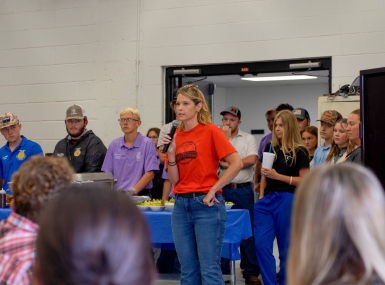U.S. House approves FY 2021 Commerce, Justice, Science funding bill
Author

Brett Mattson
Upcoming Events
Related News
On July 31, the U.S. House cleared H.R. 7617 – a $1.3 trillion, FY 2021 appropriations bill that combines six of Congress’ twelve annual spending bills – along a mostly party-line vote of 217-197. The Commerce, Justice, Science and Related Agencies (CJS) bill was included as part of the package, which sets funding levels for key state and local law enforcement programs, along with other programs important to counties.
The bill includes $33.2 billion in discretionary funding for the U.S. Department of Justice (DOJ), a $972.5 million increase over FY 2020 enacted levels. $2.4 billion of the $33.2 billion allocated to DOJ has been directed towards state and local law enforcement grant programs, including:
- Byrne Memorial Justice Assistance Grants (JAG): The Byrne JAG program would receive $525 million, a decrease of $22.2 million compared to FY 2020 levels. The Byrne JAG program enables counties, among other eligible entities, to utilize emerging and evidence-based approaches to the public safety challenges facing their jurisdictions.
- State Criminal Alien Assistance Program (SCAAP): The bill would provide $251.5 million for SCAAP, a $7 million increase from FY 2020 enacted levels. SCAAP reimburse states and local governments – including counties – for the cost of incarcerating undocumented immigrants who have been convicted of certain crimes.
- Supporting State and Local Response to the Opioid Epidemic: With a continued emphasis placed on addressing our nation’s ongoing opioid epidemic, drug and addiction-focused DOJ programs would receive funding increases in the bill. Funding for drug courts increased by $5 million to $85 million, veterans treatment court funding increased by $7 million to $30 million in FY 2021, Prescription Drug Monitoring Programs (PDMPs) funding increased to $31 million and the Comprehensive Opioid Abuse Program (COAP) was by $8 million to $188 million.
- Second Chance Act Grants: Funding for reentry programs authorized through the Second Chance Act would be increased by $10 million to $100 million in FY 2021. The Second Chance Act was reauthorized through 20221 as part of the criminal justice reform measure, the First Step Act. Second Chance Act grants provide counties with the resources needed to help individuals successfully reintegrate back into the community following their release from jail.
- Community Oriented Policing Services (COPS) Program: The bill would provide $343 million for the COPS program, representing a $3 million increase of FY 2020 enacted levels. The COPS program supports local law enforcement agencies to ensure they have the tools, personnel and resources necessary to protect and serve their communities every day.
- Juvenile Justice Delinquency Prevention Act (JJDPA): The bill would provide $337 million for JJDPA, an increase of $17 million over FY 2020 enacted levels. JJDPA is the principal federal program through which the federal government sets standards for the care and custody of juveniles and provides direct funding to counties to facilitate compliance with these standards.
The bill would require that state and local governments – as a condition for receiving FY 2021 COPS or Byrne JAG funds – comply with multiple provisions aimed at reforming local police practices, including eliminating racial profiling and implicit bias, banning chokeholds and eliminating “no-knock warrants”, amongst others.
For the Department of Commerce, the bill includes $9.54 billion, a decrease of $5.68 billion compared to the FY 2020 enacted level, and $1.2 billion above the President’s budget request. Of note for counties, the bill includes increased funding for the Economic Development Administration.
- Economic Development Administration (EDA) – The bill includes $356 million for EDA, an increase of $23 million above the FY 2020 enacted level. EDA makes investments in economically distressed communities to create jobs for U.S. workers, improve infrastructure, promote American innovation and accelerate long-term sustainable economic growth. EDA grants are critical for county economic development, particularly in rural areas, where such resources are often scarce.
Across the Capitol, Senate appropriators have yet to release funding levels for any of the annual twelve spending bills. Further complicating a path forward is the looming September 30, 2020 deadline, after which FY 2020 funds will expire, on-top of ongoing negotiations around a fifth COVID-19 relief package.
NACo will continue to engage with House and Senate appropriators to ensure necessary funding for key justice related programs and will work to ensure final appropriation measures reflect the needs and priorities of America’s counties.
Attachments
Related News

Inland port offers opportunity for Hertford County, N.C.
Hertford County, N.C. doesn’t have a lighthouse, but that hasn’t stopped its economic future from shining thanks to what became known as Project Green Lantern.

Chamber of commerce program helps keep workers on the job
Audrain County, Mo.'s Workforce Resource Assistance Program has helped employers keep staff in place, reducing turnover and promoting stability.
